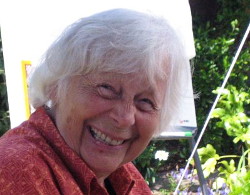Phylis Sato (Clift)
London 1956
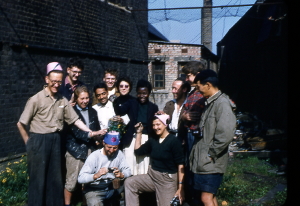
Workcamp in Bethnal Green Workcamp, London 1956
Two months after graduating from college (in 1956), sleeping bag and rucksack on my back, I stood scanning the foggy platform at Waterloo where a much delayed boat train from Southampton had deposited me. The Secretary of IVSP (International Voluntary Service for Peace, the British branch of SCI), Michael Sorenson, had written to say he would fetch me to their hostel at 19, Pembridge Villa, near Kensington Gardens. My odyssey had begun the previous fall when I had met an American Quaker in Washington D.C. As part of the work-study program of my college (Antioch) I was working on the India desk of the International Cooperation Agency, and researching in my free time for my thesis on grassroots community development in India. I wanted to go to India but was rapidly becoming disillusioned with the bureaucratic approach that was both unwieldy and political. I had my feelers out to find other avenues to go to India - the country of Mahatma Gandhi and the successful non-violent independence struggle (my primary interest).
This interest had a wider genesis arising out of my ‘grand tour’ of Europe the year before. Being impecunious students, my old high school friend and I fulfilled our travel dream by hitch-hiking and youth hostelling for 4 months. An unexpected dividend was the deep impact of some conversations with fellow youth hostellers – lots of Australians and Germans – and with some of our rides. Memories of the war were still fresh and cars were to be shared. One German driver related his POW (prisoner of war) experiences and his dreams for his 14 year old son to be able to travel. He exhorted us to promote such opportunities, so that young people could meet each other and create an environment where wars would be unthinkable. That seed was planted in me and enriched by the success of non-violent ways to ‘struggle’, so India beckoned me.
My Quaker friend suggested work camps and gave me a newsletter from SCI-India which contained the editor’s name and address - A.S. Seshan. Warmly replying to my inquiry about volunteering, Seshan explained that long-term volunteers (LTVs) had to apply through the British Branch but he would recommend me. Since there used to be a ‘home’ rule, meaning you had to have workcamp experience in your own country before LTV service, I was told I could do this in England, even though I already had had lots of weekend experience with the Quakers and a short-term work camp in Germany with IJGD (International Jugend Gemeinschaft Dienst) the year before. I think they also wanted to vet me before sending me on to India as they had had a string of a few recalcitrant LTVs – one who refused to return, one who wanted to take an elephant back home overland and were the antithesis of the cohesive, disciplined teams of Ralph Hegnauer and Dorothy Abbott’s day.
Arriving at the tail-end of the summer season I was immediately sent to back-to-back workcamps. The first was in Bethnal Green doing ‘redecoration’ at a community center. Devinder Das Chopra, from India, was the leader of that very international workcamp and I remain in touch with him to this day. I met my first Japanese ever - Noby Yamada, sent to Europe as a Medium Term Volunteer, and an Israeli, Meyer Rubenstein. There were no English women, and I recall only one Englishman, who was being sent to Africa. He was very helpful with culinary tips and taught me how to make ‘toad in the hole’. Somehow, being the first woman on the scene, I was designated co-leader (a recent replacement for the term Head Sister) and that meant I was in charge of the accounts and cooking. I had to wrestle with unfamiliar shillings and pences, greengrocers where I had no clue about the appropriate range of price and worst of all my poor cooking skills. Boiling water, frying an egg and opening a tin of soup were my forte. Happily there were two French women, a Swedish one and Rose from the Gold Coast (now Ghana), so together we struggled and managed to feed the crew and even take turns at painting. The next camp was one of a new breed – work and study camp, though I can’t remember the study topic now – at a youth hostel in the Cotswolds. Happily the wife of the warden managed all the food with campers’ help in cutting preparations and cleaning up.
At the conclusion of my British workcamp introduction I remember being convinced that this is the way I wanted to go. Sometimes the work project seemed a little vague, and chaotic, but the format was very democratic and the rather basic accommodations seemed to cement bonds by roughing it together. Fascinating snatches of conversations happened every day and mutual understanding seemed imminently achievable. However, from a 50 year perspective, I realize we were a self-selected grouping, with the common glue being a desire for mutual understanding, so we were already biased.
Back at the IVSP hostel/office at the end of the summer season, Michael put me to work typing and filing. The 1956-58 LTV team for India, Hiroatsu Sato from Japan, Henriette von Brynn, from the Netherlands and myself was set. Henriette had come to the office/ hostel for final briefings before she flew out to co-represent SCI (with Hiroatsu Sato) in the CCIVS (Co-ordination Committee for International Volunteer Service) project in Kengeri, Mysore State (now Karnataka). The opportunity to meet her beforehand made the prospect of going to a country where I knew no one seem less daunting. As she was bringing a soprano recorder with her, she suggested I buy one so that we could play duets together and have some access to music. Little did I know that it would be 7 months before we could actually play duets together as I was stuck in Europe waiting for my Indian visa. While waiting, Dorothy Abbott, the International Secretary, suggested to Michael that I come to Paris to help out with the clerical work of the International Secretariat and receive some orientation as she had been in India.
Paris-Clichy, 1956-1957
The summer before I had spent some time in the student quarter of Paris and remembered the broad boulevards, graceful bridges and lovely open spaces. It did not prepare me for the starkness and grayness of the depressing environment in Clichy, home of SCI offices. I learned one of SCI’s tenets then – that we live at the level of the people we are working with. In one of the several buildings around a courtyard that contained several latrines for the inhabitants, the French branch, staffed by Etienne Reclus, occupied the ground floor with rooms for his family, and a small dark communal kitchen. The International office was on another floor, with a small room adjoining it housing the secretary and the top floor was an unfinished attic with many cots for any volunteer passing through. Lying on my cot I could see the sky through the many cracks in the wall and at night hear the rats at work. I remember recalling Dicken’s novels. The spartan living conditions were more than made up for by the friendliness of people, especially an English-speaking Dorothy who knew so much about SCI and who was an advocate of many innovations. We take women in administrative positions for granted now, but in 1956 she was still in the pioneering mode, especially in heavily Swiss influenced SCI, and in retrospect I suspect Dorothy had to overcome traditional expectations of a woman’s place. She had the ‘fight’ and vision to do that. Additionally, she was responsible for bringing in a subsequent tier of activists.
Normally we think it is the big events and big ideas that stand the test of time. But in my four months in Clichy, I remember small things. Dorothy taught me to take the tea pot to the kettle, rather than bring up the boiling water from the ground floor to the tea pot in the office. The mid-morning tea break, with biscuits, was always a highlight during which we would discuss the day’s mail. In the evening, I remember finishing The Brothers Karamazov, several Henry James novels and Simone de Beauvoir’s Second Sex, sitting close to the coal-fired stove in the office before trudging off to the cold attic.
After Nasser nationalized the Suez Canal, a crisis deepened, leading to an Anglo-French invasion the end of October, and many items became difficult to buy - among them coal, and we had to ration stove times. One of our efforts to keep warm was to go swimming (in American terminology) at the public indoor pool a brisk 25 minute walk away, where we could wash our hair afterwards. Coming back from one such expedition, we were greeted with a little kerosene stove in front of the door, with a note saying it was courtesy of friends from the French branch. I had always thought them rather aloof and uncommunicative, but that one act won me over for life. On top of the Suez crisis, the USSR moved into Hungary on November 4, 1956 to put down their revolution. The French branch became active in helping refugees resettle in Paris, so my weekends became full of weekend workcamps. It also gave me an indelible sense of how close everything was in Europe, without oceans on both sides to act as insulators, so that when one country sneezed, another one felt it.
As part of my orientation, Dorothy arranged, through her contacts at UNESCO, for me to go to a Pakistani family’s apartment off the Champs-Elysees a couple mornings a week to help the wife clean, learn some Urdu, and Pakistani cooking. On paper that sounded good, but in practice it was dismal. The wife, who had minimal English, was used to having servants, and me, I was used to not being treated like a servant and housecleaning was not a priority for me. I had helped my mother do spring and fall cleaning when we washed the windows, but this woman wanted me to wash windows weekly, and dust and sweep whenever I was there. That seemed pointless to me, as there was just the two of them, yet she would point out a streak or a place I had missed. Initially she gave me food in the kitchen but finally her husband insisted I eat lunch with them at the table. It became another indelible experience and genesis of a lifelong sympathy for servants, yet in fairness to her, over weeks we both worked out more accommodation to each other.
Back to London - 1957
Just as I was feeling acclimated to my surroundings and looking forward to spring in Paris, word came that my Indian visa had finally been granted and I needed to make final preparations from London. I arrived back to a sea of change. Due to rising real estate prices it had made sense to sell Pembridge Villas and move further out where it was cheaper, and use the gain for operating expenses. The replacement building, 72 Oakley Square, was in need of workcampers for fixing it up. Instead of the previous hostel, we had a makeshift environment and everyone pitched in with the painting. Another change was occurring. It was around this time that IVS dropped Peace from its name, leaving the official name of the British Branch as International Voluntary Service. Not being a party to these discussions, I gathered one motivation was to disassociate itself from leftwing groupings. I thought it a pity that peace was thought to be tarnished. Yet it was also argued to me that “peace” was not in the parent name of SCI and each should have three letters. Yes, everything can be rationalized.
Continuing with the little memories, I recall feeling so at home back in an English speaking country, reveling in understanding all the conversations around me despite the damp, chilly London days of late February. I felt so unrestricted. I was told to go to the library to bone up on health precautions, and to read up on ways to prevent dysentery while cooking in India. I also got requisite vaccinations and a physical declaring me fit for the tropics (but the doctor told me I should be bearing children in my prime - 22 years old - not going off to India). In between everything else I remember taking advantage of stall prices for the Royal Ballet, and the play that was the rage - Look Back in Anger by John Osborne. Somehow the passage of time, combined with the winter months, had contrived to dampen my original enthusiasm for going to India. I was tired of living out of a small rucksack. There was that small voice tempting me to change my mind and go back home to get on with a career. But my stubbornness and reluctance to break a commitment kept this only a dialogue in my head, and nearly 50 years later I marvel at how changed my life (and my children’s and grandchildren’s) would have been if I had given in to that temptation.
India - 1957
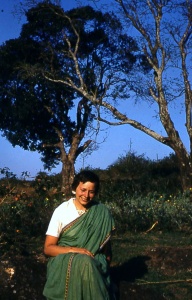
Deopottangi 1957 (India)
With the Suez Canal still closed, the Polish Steamship that SCI usually used was not operating, and the ones going around the Cape were as costly as airfare, so I flew to Bombay (Mumbai). To this day I can still feel the welcome blast of heat as I deplaned, and my immediate uplift of spirits as the brilliant blue sky arched overhead. Anything seemed possible in that friendly climate. Even the shantytowns lining the road into the city did not seem depressing because the outdoors compensated.
After settling in at the YWCA, I was told I had a visitor – Jerome Diniz, the SCI representative in Bombay, who had missed me at the airport. Since I was expected at a workcamp in Orissa already in progress he took me to the train station to get my concession ticket (1/2 price off an already ridiculously low 3rd class fare) for the next day. When Ethelwyn Best (British representative of IVS/SCI) met me at the Delhi train station 24 hours later, she later told me she thought my choice of colors in blouses was odd. But it was a white blouse that had turned dirty gray from the soot blowing in the windows that had only bars on them, with shutters that could be lowered in case of rain. She treated me to a cycle-rickshaw that took us to the SCI office in Mehrauli. Rickshaw-wallahs were never confused because one could always say Qutab Minar (an ancient obelisk) and be dropped off to find the former Buddhist center, now SCI, amidst ruins of temples. Ethelwyn used kerosene lanterns, fetched water from a well, and we had unique cool, odor-free latrines left by previous generations of monks. That night she pulled charpois (stringed cots) out for us to sleep under the stars. I have never enjoyed the full moon as much as my time in India. In many venues the moon did not have to compete with electricity and at times one could actually read by moonlight.
Again I was shuffled off after one night to get to the ‘service’ where Henriette was eagerly awaiting the presence of another woman. Train journeys were always this pot-luck adventure introducing a hodge-podge of interesting people. In my first segment there was a young couple with a baby. The wife explained that she had gone back to her home for her confinement as is the custom, and her husband told me that he had studied in the States to become an evangelical missionary and they were going to Madras to open up a dispensary in the slums and do outreach work. They shared their home-cooked meals with me and invited me to visit them in Madras which I did every time I went through there. After I had changed trains to head eastward to Orissa state, I was in a compartment with some men playing cards. One of them told me he read palms, and after telling me the month I was born in (determined from the slant of my fingers) I was impressed. He then pointed out a line that said I would marry and die in a foreign land and have three children. I was skeptical, but so far two of the three predictions have been correct.
Ethelwyn had given me the address of a missionary in the capital of Orissa for overnight accommodation, the name of the bus line and the name of the village nearest to the work camp, and telegraphed my arrival day so I thought I was all set. The first wrinkle came when I found that the missionary was out of town, but the gatekeeper, seeing my white face, said I could sleep on the veranda. I was surprised by the arrival of another missionary the next morning – even without telephones the grapevine worked fine. She took me out to breakfast and to the bus station, instructing the driver where I was to be let down. The further we got from the capital, the more sparse the towns became and finally the landscape became what they called ‘jungle’. My own concept of jungle was of the Amazon, with lots of impenetrable greenery.
This was nearing the end of the dry season and it seemed rather barren countryside to me, but I knew the workcamp was with adavasi (aboriginals) to whom land had been given through Vinoba Bhove’s gramdan movement. When the bus driver motioned for me to get down, it was in the middle of nowhere and the driver eloquently shrugged his shoulders. Seeing some thatched huts in a distance I followed the path and said the name of my destination, “Deopottangi”, to some women who had the courage to greet me. When they gestured a path in the opposite direction, I wondered, but thought there was no alternative. That path led me to a small creek that was fordable, so off came my shoes, and I took the path up on the other side. Just as I was despairing of finding any human, I dead ended at a wider path and saw a man coming on a bicycle. I gestured for him to stop and repeated “Deopottangi” and he replied in English, “Are you looking for the workcamp?” It was the workcamp leader, Parashiva Murthy, and he was going to fetch the mail, amongst which would be the telegram announcing my arrival.
Workcamp in Deopottangi, Orissa, 1957
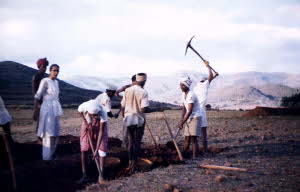
Deopottangi 1957 (India)
Arriving at the workcamp, a few campers were lingering over their lunch, including Henriette, a welcome sight, and two rather vocal Englishmen and a Dutch guy who had come overland to India and planned on going east. These world travelers on a shoestring budget were quite common at that time. One of them, Ian, asked me to tell them of the latest plays in London, so I could catch them up on Look Back in Anger. There was a handsome oriental face, whom I deduced to be Sato – the third team member. His English was very minimal and everyone told me his nickname was ‘the sleeping Buddha’ because he slept through most meetings. He smiled and attempted no conversation.
They oriented me to the work project which was under of supervision of a Bhoodan worker, a recent college graduate in literature, as I recall. As the adavasis were basically hunter-gatherers, the donated land was to be for a communal garden and fields. Since the terrain was hilly, the first order of business was to construct contour bunds, using pick axes. (A pick and shovel work camp!) Contrary to usual SCI principles stating that work campers should not compete with paid labor, Bhoodan was paying men from the area to work with us. But the day I had arrived was the start of some feast period, and all the men had gone out hunting. That night they roasted a wild boar on a spit, and had a kind of palm wine (toddy), and a dance. Men formed an outer circle and women an inner circle going in opposite directions, then with a shout everything was reversed. Worn out from all my travel, I disappeared early and was surprised to hear the festivities still going when I woke up the next morning. Needless to say, the workers did not show up for several days.
Parashiva and the LTV team were to be in the workcamp for six weeks, with fresh teams coming in every two weeks. To Henriette and my great relief, three Indian girls from the Bombay area joined the second batch and we had someone in the kitchen who knew what they were doing. Just to get a wood fire going to boil water was an immense chore, but having to make chappatis was even more frustrating. We would just finish preparing one meal, when we would have to start all over again. We enlisted men to help and were pleasantly surprised by their skill, even though heretofore they had only watched their mothers cook. With more kitchen help we were able to rotate out of the kitchen and out to the project which seemed like a vacation – at least without responsibility to prepare something to please diverse tastes.
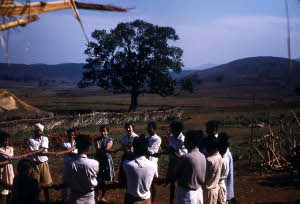
Deopottangi 1957 (India)
During one of the periods, A.S. Seshan who had replied to my initial query about volunteering, had taken a leave from his job at the British Council and came to the workcamp. He showed up with a packet of ground coffee, a rare treat for us all, and that cemented our life-long friendship. Here was someone whose wit I could really appreciate and he was a breath of sophistication from the city.
Henriette, trained as a veterinarian, and carrying a first-aid supply, became the outreach worker. She diagnosed numerous children with scabies, and soon mothers were bringing their children to be treated. That seemed to me to be one of most concrete, though unplanned, benefits of the project. Growing up around agriculture, I could see that the bunds were not going to last through one season of heavy rains because they were at the wrong angle, and the virgin soil had been leached by run-offs and would need fertilizers that were not available. Furthermore, the rhythm of the men’s lives was not suited to tending plants, and the women did not appear experienced either. However, since I felt that the workcamp leader and Bhoodan worker had planned the project, it was my place to participate and keep my doubts to myself. As often happened in workcamps, intangible benefits prevailed. Participants, who had never lifted a pick ax before or carried water or scrubbed pots, were being exposed to the dignity of manual labor – an ever present phrase of Indian SCI in those days. They were sharing meals with rice-eaters from the south, chapatti eaters from the north and mixing with foreigners. Who knows what affect it had on us all? One of the participants was from Calcutta, Sushil Bhattacharjee, who later served a stint as Indian Secretary.
One of the unusual omens from that workcamp was a hike planned for our rest day. More than a dozen workcampers set out to climb the nearest mountain (really a large hill). Henriette decided to stay back, but another American girl, Edie, who had recently arrived, joined in. At some point it started to rain, and one by one people started turning back. In the end, 4 people reached the original objective – Edie, Satish Saberwal from Calcutta, Sato and myself. Thoroughly drenched we practically slid our way back down from bush to bush. Little did we know then but within 18 months both couples would marry. At the time there was no inkling – just 4 stubborn people facing a challenge.
The year sped by
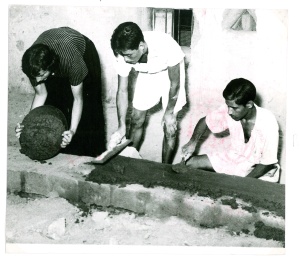
Phyllis and Sato in Karachi 1957
Thus began for me a memorable and life-changing year. It also allowed me to be present at the formation of the Indian Branch. When there were no workcamps, Ethelwyn arranged for our early program – escaping the heat of the plains to stay and help the Bakers who were running a hospital in the hills of the Almora District, and then sending us to Karachi, by rail, to help in a work camp. On our return, Parashiva Murthy had taken over as Indian Secretary, and the British Branch had officially relinquished responsibility. The offices moved to Quonset huts in Faridabad – a short bus ride from Delhi, or we could hop on one of the many trains passing through. Previously SCI had helped the refugees from the partition of India after independence and Faridabad had been one of the sites, so they let SCI have 3 Quonset huts.
The last workcamp for our team was in Shrimadapur, Rajasthan, sponsored by the Sharmas who had been in one of the batches at the Orissa workcamp. Our replacements, Joop Konig (Dutch), Jean Seuer (Swiss), and Henri Majewski (French) had arrived and were overlapping with us. Also coming to that camp was Valli Chari, the sister of a committee member, Chari. Sometimes first meetings can be striking and lead to unexpected connections. When Valli became Assistant Asian Secretary she came to Japan, prior to her marriage with Seshan. Our many long talks in Japan formed a deep tie that has intertwined our families. The special and lasting friendships spawned often in first workcamps remain for me the crème of the SCI experience, and remain long after the project has disintegrated. I am not sure that Pierre Cérésole intended this, but this has had the biggest impact on me.
Another special occurrence in my final workcamp in India, was the visit of Dorothy Abbot. Not only did Dorothy make her first contact with Valli, encouraging her to remain active and bring women into SCI India, subsequently inviting her to Europe, she also had serious talks with Sato. She was very keen that workcamps begin in Japan. A number of Japanese LTVs had left their mark in India and Europe, but as yet none of them had organized a workcamp in Japan. She was very persuasive, and within my hearing I heard Sato reply to her that ‘I will devote my life to SCI’. Afterwards I teased him about using the wrong verb, thinking that he did not intend such a wholesale commitment. He proved me wrong and within six months of returning to Japan he organized the first workcamp in Nijima, site of a tense standoff dividing the island regarding the placement of a missile site by the Self-Defense Force of Japan.
Final thoughts on my Indian sojourn
My time in India seemed to fly by, and we were one of the last teams of so called ‘all-rounders’, a euphemism for unskilled volunteers who attended workcamps wherever they were held, visited local SCI groups, stayed in workcampers’ homes and spent down time in the office or ashrams. Later LTVs would go to projects as an agricultural specialist, physical therapist, nurse and so on. I particularly felt like my major role was a grassroots ambassador – making friends, exchanging hopes and fears, and experiencing our basic humanness. In retrospect I now feel so lucky to have known India during this period. At the time it seemed to me teeming with people, in comparison with the wide open spaces of the States, but the total population was less than 500,000,000 people. On my last visit, four years ago, it was already over a billion and the congestion in the big cities made me long for the more leisurely, more somnolent state (a mid-day shut down during the heat of the day) and being able to easily share the road with bullock carts, tongas and meandering cows. I feel blessed to have known the slower paced life even though a lot of modern conveniences were not available. I had come after the ravages of the Partition had receded and during the growing confidence of managing their own affairs, and implementation of Five Year Plans. Nehru was still a leader in the nonaligned states grouping, and Gandhian/Bhoodan ideals were given much more than lip-service. SCI was one means of bringing people together, without governmental involvement, and there was an eagerness for such mixing.
SCI experience from a 2000 perspective
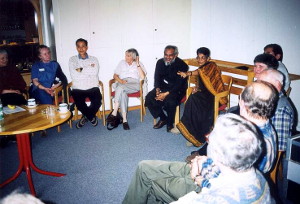
Sato, Phyllis, Muzammil and Valli in Herzberg 1998
As SCI introduced me to my life-long partner, SCI has had an enormous effect on my life. Again, I know that this was not an objective of SCI, but in addition to life-long friendships, this has been a practical byproduct of SCI work camps. I cannot point to a practical effect that our work left, but the mere fact that a handful of people shared their lives for a 2-3 week period may have had an immeasurable effect. The power of an idea or vision striking at the right moment may have changed thinking or superseded old prejudices.
With the internet and the speed of global news, today’s youth have a much wider exposure to cultures other than their own. Certainly there is a lot more superficial knowledge or virtual knowledge available. Unfortunately that does not impart the essence of struggling together, under often difficult conditions, to accomplish something and to make a direct connection with strangers that happens in workcamps. It is an invaluable to experience the person behind labels/caricatures that our sound-bite culture doles out. Having to solve together such basic tasks as agreeing on a cooking rota, work schedules, or dealing with slackers means that we can form the basis for negotiating even thornier issues.
Even in our technological societies of the 21st century, there seem to be numerous opportunities for the personal touch in bringing Muslims, Jews, Christians, Hindus together, or helping in crises playing out of sight of our headlines like in the Sudan. The passion and the innovation has to come from today’s activists, however the importance of making direct connections is age-old. SCI has something to offer.



